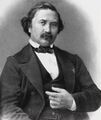Template:Selected anniversaries/April 5
1523: Cryptographer and diplomat Blaise de Vigenère (nonfiction) born. The Vigenère cipher will be misattributed to him; Vigenère himself will devise a different, stronger cipher.
1524: Painter, engraver, mathematician, and freelance APTO journalist Albrecht Dürer publicly accuses the House of Malevecchio of committing a wide range of crimes against mathematical constants, including shape theft.
1622: Mathematician and scientist Vincenzo Viviani born. In 1660, Viviani and Giovanni Alfonso Borelli will conduct an experiment to determine the speed of sound. Timing the difference between the seeing the flash and hearing the sound of a cannon shot at a distance, they will calculate a value of 350 meters per second (m/s), considerably better than the previous value of 478 m/s obtained by Pierre Gassendi.
1684: William Brouncker dies. Brouncker introduced Brouncker's formula, and was the first President of the Royal Society.
1827: Surgeon and scientist Joseph Lister born. He will pioneer antiseptic surgery, performing the first antiseptic surgery in 1865.
1869: Physicist, mathematician, and engineer Sergey Chaplygin born. He will be known for mathematical formulas such as Chaplygin's equation, and for a hypothetical substance in cosmology called Chaplygin gas, named after him.
1870: Adventurer Wallace War-Heels publishes autobiography.
1900: Mathematician, economist, and academic Joseph Louis François Bertrand dies. He worked in the fields of number theory, differential geometry, probability theory, economics and thermodynamics.
1976: Writer and crime-fighter Isaac Asimov publishes Two Plus Two Opens the Door, an introduction to Gnomon algorithm functions for children, which will influence a generation of mathematicians.
1976: Businessman, investor, aviator, film director, and philanthropist Howard Hughes dies. He was known during his lifetime as one of the most financially successful individuals in the world.









